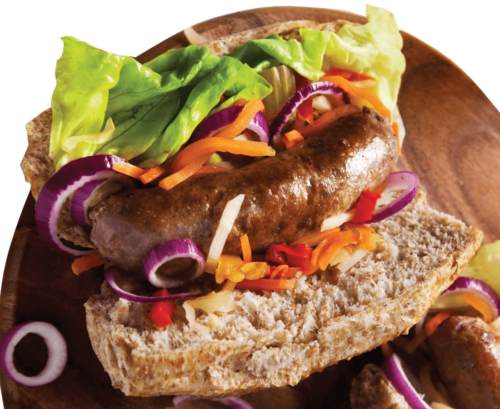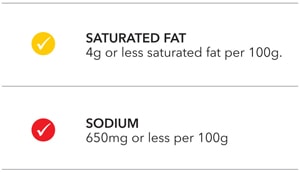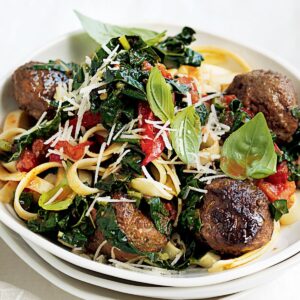
Sausages are part of Australia and New Zealand’s food fabric, but not all are health superstars. Here’s how to choose the best sausage for you.
What’s available
Sausages are ground meat (pork, beef, turkey, venison, lamb, chicken) mixed with herbs, spices, flavouring, salt and filler, which may be wheat, rice or sorghum flour plus preservatives.
There are many flavours available, from the traditional plain pork or beef, to chicken, turkey, venison and vegetarian (soy based), to combinations such as pork and apple, lamb and mint, and cheese.
Non-vegetarian sausages are made from fresh meat so need to be cooked.
Frankfurters, hot dogs and (most) chorizo are made from cured or smoked meats that are lightly cooked, so we don’t need to cook them before serving. Chorizo, however, may also be made with fresh meat in which case it would need to be cooked.
The amount of meat in sausages we looked at varied from 60 to 90 per cent, and the protein content ranged from 8.4 to 21.4 per cent. The amount of protein in the vegetarian sausages was around 13-14 per cent.
Note: There is a good selection of gluten-free sausages available.
Saturated fat
Sausages can be high in saturated fat which we need to keep to a minimum. In the sausages we looked at, the saturated fat content varied from less than 1g per 100g to 13g per 100g. We recommend choosing sausages with 4g or less saturated fat per 100g.
Tip: Reduce the fat content by draining the fat when cooked and patting down with a paper towel. Also, reduce the portion size — one sausage may be enough!
Sodium
One of the major contributors to our intake of sodium is processed meats. Sausages and hot dogs are included in this group and have been identified as a focus for reducing sodium content. HeartSafe, a voluntary collaboration among the Heart Foundation, the food industry and food technology experts, has set sodium targets to help reduce sodium amounts in low-cost, high-volume foods. The target set for sausages is 650mg per 100g. We recommend choosing sausages with 650mg sodium or less per 100g.
Preservatives and other additives
Some sausages contain preservatives, namely sulphites (numbered 220-228). Many sausages also contain MSG (number 621) as a flavour enhancer. These can cause asthma or an allergic reaction in some people.
Processed meat
The World Health Organization (WHO) recommends people moderate their consumption of processed meats to reduce the risk of colorectal cancer. Processed meat refers to meat that has been transformed through salting, curing, fermentation, smoking, or other processes to enhance flavour or improve preservation. This includes smoked and cured sausages such as frankfurters and smoked chorizo, and other sausages preserved with salt.
How to choose
Use this checklist to choose healthier sausages:

Article sources and references
- Bouvard V et al. 2015. Carcinogenicity of consumption of red and processed meat. The Lancet Oncology 16:1599–1600https://www.ncbi.nlm.nih.gov/pubmed/26514947
- Food Safety. Ministry for Primary industries. Sulphur dioxide/sulphites in meat www.foodsafety.govt.nz Accessed August 2016https://www.mpi.govt.nz/dmsdocument/21407-sulphur-dioxide-sulphides-in-meat-pdf/loggedin
- Heart Foundation Reducing sodium and sugar in processed foods www.heartfoundation.org.nz Accessed December 2016https://www.heartfoundation.org.nz/about-us/news/blogs/reducing-sugar-in-kiwi-food
- Micha R et al 2010. Red and processed meat consumption and risk of incident coronary heart disease, stroke, and diabetes mellitus. A systematic review and meta-analysis. Circulation 121:2251-2https://www.ncbi.nlm.nih.gov/pubmed/20479151
- Woodward E et al. 2012. Key opportunities for sodium reduction in New Zealand processed foods Australian and New Zealand Journal of Public Health 36:84-9https://www.ncbi.nlm.nih.gov/pubmed/22313711
- World Health Organization. 2015. Links between processed meat and colorectal cancer www.who.int/mediacentre/news/statements/2015/processed-meat-cancer/en/ Accessed August 2016https://www.who.int/mediacentre/news/statements/2015/processed-meat-cancer/en/
- World Health Organization. 2015. Q&A on the carcinogenicity of the consumption of red meat and processed meat www.who.int/features/qa/cancer-red-meat/en/ Accessed August 2016https://www.who.int/features/qa/cancer-red-meat/en/
www.healthyfood.com










